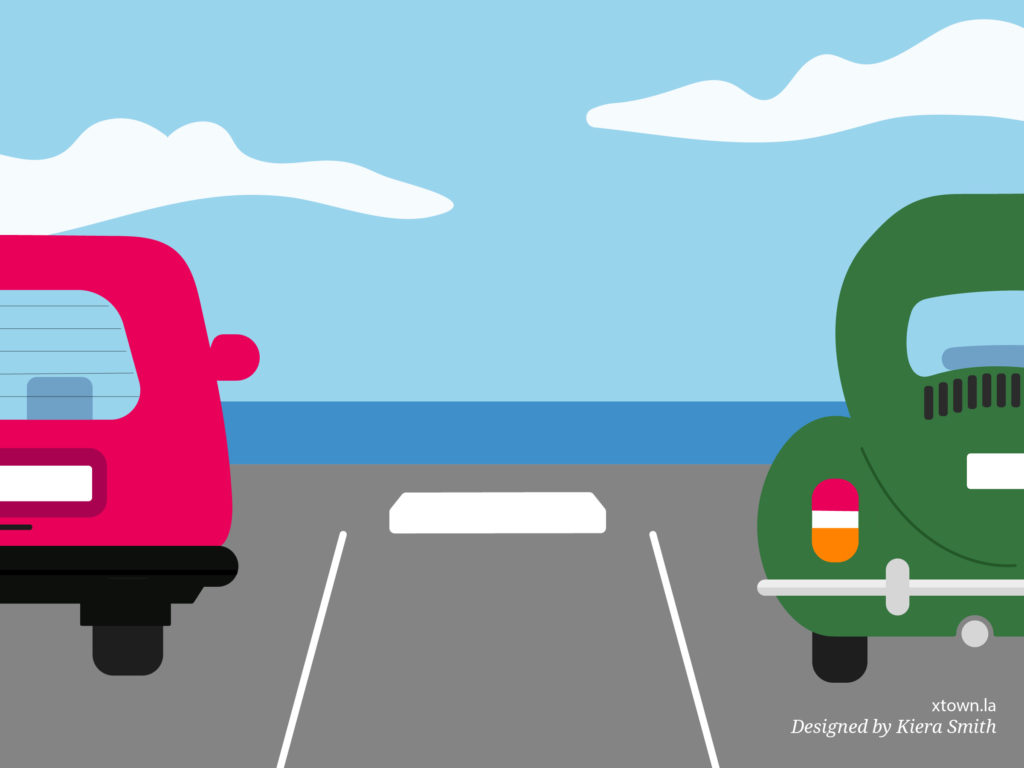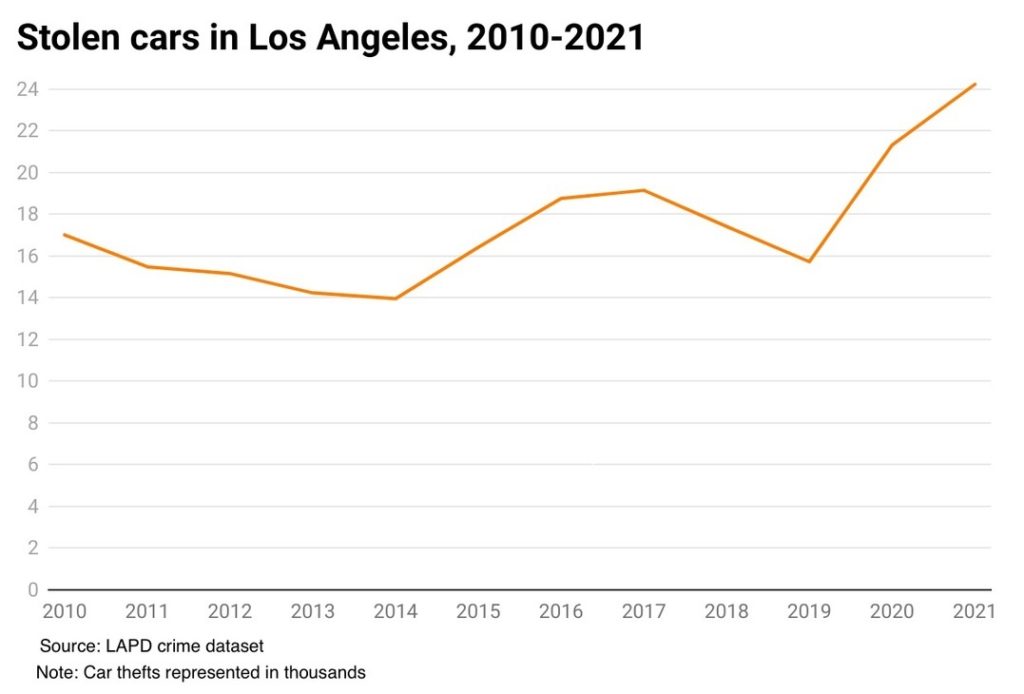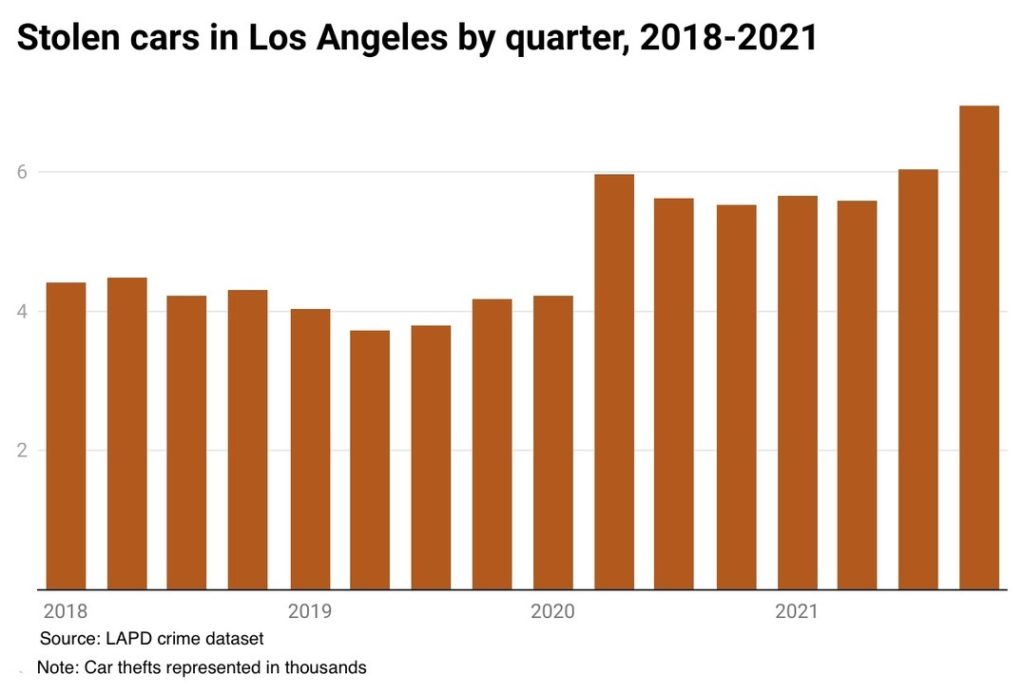Los Angeles car thefts speed to new highs

The number of stolen vehicles in the city of Los Angeles has been rising for nearly two years, but car thieves shifted into an even higher gear in the final quarter of 2021: From October through December, 6,946 vehicles were taken, according to publicly available Los Angeles Police Department data. That is nearly 1,000 more than in any other three-month period in at least 12 years.
The aggressive activity brought the 2021 total of vehicle thefts to 24,224, the highest tally since at least 2010. It marks a 13.7% increase from the 21,313 cars that went missing in 2020, and a 54.1% rise over the 15,724 reported stolen in 2019.

Vehicle thefts were sustained and consistent throughout the quarter. Starting Oct. 3, more than 500 vehicles went missing each week for 12 consecutive weeks. Only three other times in 2020 were more than 500 cars stolen in a single week.
Pandemic ignition
In the years before the pandemic, car thefts had been declining in Los Angeles, falling from a previous high of 19,143 in 2017.
When the coronavirus hit in March 2020, businesses closed down, people drove less and parking restrictions were eased. Vehicles sat unattended on the streets for lengthy periods, driving a spike in thefts that peaked during the summer. The number fell slightly as the economy reopened and drivers got back behind the wheel. Then levels began soaring once again, most noticeably in the latter half of 2021.

Numerous factors are believed to be driving the trend. A recently released video from the multi-agency Task Force for Regional Auto Theft Prevention (TRAP) warns that thieves in particular are targeting late 1990s Hondas and early 2000 Chevy Silverados, as well as Kias and Hyundais from 2010-2021. The video says these vehicles have locking and security mechanisms that are not difficult to defeat.
“As word gets out that these cars are easy to steal, more people are stealing them,” said LAPD Lt. S. Bruce Hosea, who works with TRAP.
[Get COVID-19, crime and other stats about where you live with the Crosstown Neighborhood Newsletter]
There are other reasons for the uptick. Law enforcement officials have said that numerous vehicles go missing because drivers leave their key fobs in the cup holder after parking. Hosea also said that some thefts may be the result of people experiencing homelessness trying to stay warm in winter.
“People might just be sleeping in them overnight, especially as the weather is getting cold,” he said.
According to Hosea, although sometimes catalytic converters are missing when a vehicle is recovered—the devices that reduce harmful emissions contain valuable metals that can be sold for a handsome price to unscrupulous repair shops—cars are not commonly stripped of parts. Police have said that vehicles are often recovered a few days after being taken, many times in the same neighborhood, indicating thefts may be propelled by a need for transportation.
For most of the past decade, Boyle Heights was the car-theft capital of Los Angeles. In 2021, Downtown emerged as the epicenter of stolen vehicles, with 988 taken, surpassing the 787 that went missing in Boyle Heights. Other neighborhoods with high numbers in 2021 were Van Nuys (689), Koreatown (687), Westlake (687), Historic South-Central (553) and Hollywood (549).
Despite the uptick, law enforcement officials stress that common sense can help people hold onto their ride. In the TRAP video, Det. David Williams urges car owners to make sure doors and windows are always locked, that they park in well-lit places, and that they not keep any keys in the car.
How we did it: We examined publicly available vehicle theft data from the Los Angeles Police Department from Jan. 1, 2010-Dec. 31, 2021. We also looked at LAPD Compstat data. Learn more about our data here.
LAPD data only reflects crimes that are reported to the department, not how many crimes actually occurred. In making our calculations, we rely on the data the LAPD makes publicly available. LAPD may update past crime reports with new information, or recategorize past reports. Those revised reports do not always automatically become part of the public database.
Want to know how your neighborhood fares? Or simply just interested in our data? Email us at askus@xtown.la.






